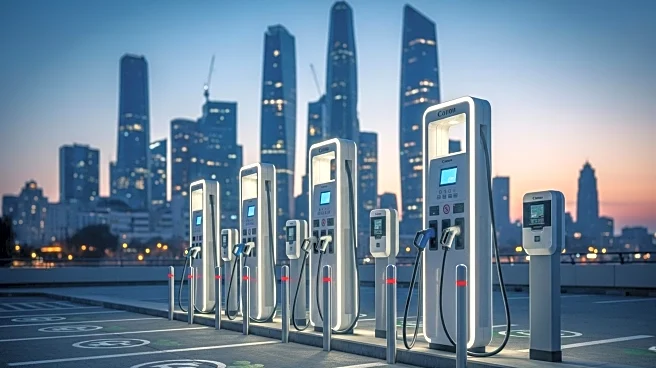What's Happening?
The UK automotive industry has achieved a trade milestone, generating £115bn in imports and exports in 2024, five years after Brexit. According to the Society of Motor Manufacturers and Traders (SMMT), this marks the third consecutive year of surpassing £110bn in trade. Despite Brexit-related challenges, the UK remains a global trading powerhouse, with the EU accounting for nearly 60% of the sector's total trade. The trade dynamics have shifted, with a 424% increase in UK-EU electric vehicle trade since 2019. However, new battery rules set to take effect in 2027 could impose tariffs of up to 22% on electrified vehicles that fail to meet local content thresholds.
Why It's Important?
The growth in UK automotive trade, particularly in electric vehicles, highlights the sector's resilience and adaptability in a post-Brexit environment. The surge in EV trade reflects the industry's shift towards electrification and its impact on UK-EU trade relations. However, the impending battery rules pose a significant risk to the competitiveness of EVs, potentially affecting market access and pricing. The industry's ability to navigate these challenges will be crucial for maintaining its global trade position and advancing towards net-zero goals.
What's Next?
The SMMT is urging the UK government to negotiate a workable definition for cathode active materials and monitor compliance with the 2027 rules. Efforts to rejoin the Pan-Euro Mediterranean Convention could ease origin requirements and widen market access. The industry will need to scale up battery supply chains to meet local content thresholds and avoid tariffs. Stakeholders, including automotive manufacturers and trade bodies, will likely advocate for policy adjustments to support the sector's growth and sustainability.
Beyond the Headlines
The evolving trade landscape may lead to broader discussions on the UK's industrial strategy and its alignment with environmental goals. The focus on electrification could drive innovation and investment in green technologies, influencing the future of transportation and energy sectors. The trade dynamics also reflect the geopolitical shifts post-Brexit, with implications for international trade agreements and economic partnerships.









